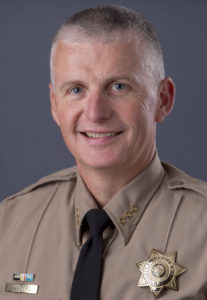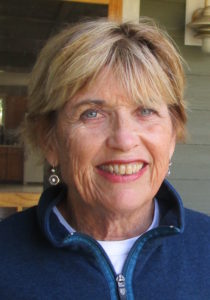
By QUINTON SMITH/YachatsNews.com
Laura Mulroney’s first encounter with William Minkema occurred Sept. 3 at the front door of the C&K Market she manages in downtown Yachats.
Minkema was not wearing any clothes.
“I have never, absolutely ever, even once had a naked person in here,” said Mulroney, who has managed groceries for 20 years. “He wasn’t mean. He was definitely very high. He just didn’t understand why he had to have clothes on.”
The C&K Market manager’s experience was just one of many that Friday and Saturday as Minkema, 29, and his companion, Brittany Hoffman, 26, walked fully or partly naked around Yachats and up and down U.S. Highway 101.
They caused a stir over two days – and a lot of consternation on community Facebook pages. But they weren’t necessarily doing anything illegal until they disrupted highway traffic – and twice cited for disorderly conduct — just what most folks would consider improper.
The Lincoln County Sheriff’s Office and Oregon State Police talked in person or over the phone to business owners and residents who complained about the naked couple.
When the agencies responded, they used patrol deputies or troopers to try to convince Minkema and Hoffman to put on their clothes and get help. All they could do were issue citations for disorderly conduct and a date to appear in court or pay a fine.
What was not available was the county’s much-ballyhooed “Comet” program, which paired a sheriff’s deputy with a social worker responding to incidents where a mental health worker is as valuable as an armed deputy. The mental health worker part of the team tries to talk to the troubled person, see if they’re willing to accept help instead of a citation or a trip to the Lincoln County Jail.
But after being launched in March 2020 with the aid of a $167,000 federal grant, the program – called community outreach and mental health enhancement team, or COMET — was mothballed this spring because of the lack of deputies and social workers.

“The tools that a deputy in uniform has is a lot different than having a mental health counselor along,” said Sheriff Curtis Landers. “There’s a lot of need for it all over the county.”
The issue for Lincoln County is there are not a lot of people willing to do the work.
Landers had once hoped for two “Comet” teams. The single team disbanded when the original counselor and the office case manager funded by the grant left the county.
The county’s behavorial health department has nine vacancies for counselors, said Kristin Bezdek, the department’s interim deputy director, four of which have been open for 1½ years.
“There is a nationwide shortage of mental health professionals — it’s estimated that one-fourth of behavorial health staff and one-half of substance use disorder staff have left the field since the coronavirus pandemic began,” Bezdek said. “Recruiting for behavorial health staff has always been challenging in rural counties, but now it’s a crisis statewide.”
At the same time Landers said the sheriff’s office has been operating with an “all hands on deck” philosophy because it is down five of an authorized 29 patrol deputies. Two deputies are now in training, Landers said, and there are three vacancies – but it takes a year to get a deputy hired, trained and qualified to work alone.
“It’s been difficult to get qualified applicants,” Lander said. “It’s not just us, it’s law enforcement in general.”
Little mental health help available
Minkema and Hoffman are just the latest examples of people around Yachats possibly needing help who either refused it or who didn’t break any laws.
On Aug. 21 a resident on Ocean View Drive called 9-1-1 to report a man with a backpack and bicycle along the road the previous night was “yelling throughout the night and apparently was directly his anger towards the ocean,” according to an Oregon State Police report.
There have been incidents during August of transients in the Yachats area intermittently screaming, yelling or throwing things at passersby – but who quiet or calm down when approached by residents or deputies.

Mary Ellen O’Shaughnessey, who coordinates volunteers for the Yachats Farmers Market on Sundays, and others have called sheriff’s deputies several times over the summer to address agitated transients near the Commons or downtown businesses. But because most incidents occur on public property or they’re not breaking a law, there’s little deputies can do once they arrive.
“I think they’re as frustrated as we are,” O’Shaughnessey said of deputies she has talked with. “This is just a tough situation for everyone – for the person involved, for the sheriff’s department and for all of us watching it happen.
“The deputies I dealt with were responsive, communicated well and realized what was needed in the situation we were dealing with was mental health services and professionals … but there is none to be had in this county.
“I can have a crazy moment but I have a home, a family and resources,” she told YachatsNews. “People on the streets do not have a home, do not have resources and are often estranged from their families. It’s all very tragic. We haven’t figured out a way to provide these services, yet you know they are suffering.”
Naked man cited twice
In regards to Minkema and Hoffman, the sheriff’s department said in a statement that “For most of the morning on Friday, Sept. 3 callers were reporting solely the act of the man being nude, which in and of itself, is not a crime in Oregon so long as the person is not intending to sexually arouse themselves or others.”
“We followed up with most, if not all of the callers that morning, and determined the man was not breaking any laws, so no enforcement action could be taken. Law enforcement was unable to entice the man to put on clothes and since he was abiding by all laws, our hands were tied. He was contacted by Yachats Fire Department as well, and again refused assistance and refused to put on clothing.
“A few businesses called about the man entering premises in the nude. Each representative of those businesses advised our call takers that the man left when asked, so again, no laws such as criminal trespass were broken,” said Sgt. Jack Dunteman.
Later that Friday, deputies cited Minkema for disorderly conduct after he was walking in and out of traffic on Highway 101 but were unable to take him to jail because of COVID-19 restrictions. A bystander offered to take Minkema and Hoffman to Beachside State Park, where they apparently spent the night before walking to Yachats again.
Dunteman said Minkema refused to participate in a diversion program, which was offered to him in lieu of arrest. The voluntary program, Dunteman said, is designed to allow officers “to redirect suspects engaged in low-level criminal activity to resources and individualized services” with help of a case worker.
On Saturday afternoon state police responded to calls that Minkema was again walking in traffic just south of Yachats and was arrested and taken to jail.

Critical shortage of counselors
Bezdek said the county health department has been operating with less than half of its authorized adult clinical counselor positions.
“Our crisis team is on a state-approved variance that allows for no coverage at the local emergency rooms from midnight to 8 a.m. because we don’t have the bodies to do 24 hour coverage,” she said in an email to YachatsNews.
Bezdek said the state is conducting surveys to see why mental health workers are leaving the profession. She believes the departures are affected by the stress of becoming a first responder during a pandemic, the rise of tele-health jobs has made it more difficult to compete for qualified staff, and the shortage and cost of daycare for employees with chidren.
“The state is working on some plans for statewide recruitment and retention, and we’re working locally on some ideas,” she said. “One of the biggest challenges in recruiting mental health professionals here is, of course, the lack of affordable housing.”
Bezdek said her department has been able to hire a half-time case management person who will work with law enforcement and the county’s crisis management team to find services for people in turmoil.
But full staffing for the COMET program is likely to be difficult, despite how well it worked previously.
“There’s been a lot of curve balls thrown at this program,” Landers said. “It’s a priority … but I have no idea when it might come back.”



When the winds and rains return we will be rid of this issue. In the meantime keep up a good home defense system.